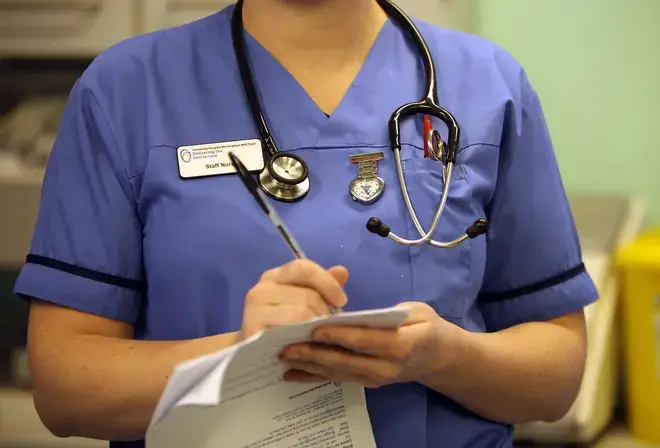The NHS and influential unions have been accused of allowing the 'institutional bullying' of physician associates and anesthesia associates , with some being driven to 'suicidal' thoughts as a result of their treatment.
Introduced to the NHS over twenty years ago, physician associates (PAs) and anaesthesia associates (AAs) are tasked with supporting doctors by taking on duties such as taking medical histories and conducting physical examinations.
Their numbers within the NHS are set to treble to 12,000 by 2036.
Yet doctors have accused these medical professionals of acting beyond their level of competence, creating a heated internal debate within the NHS which health secretary Wes Streeting has described as “toxic”.
His concerns are supported by new figures, seen exclusively by LBC, which show the NHS is set to receive a deluge of industrial tribunal cases from PAs as a result of their treatment by fellow medical professionals, with one in twelve PAs preparing to instruct employment lawyers.
Whilst some have felt ostracised and bullied at work, online posts have also seen death threats and acid attacks directed towards them.
Until recently, Dame Clare Gerada ran a service providing mental health support to medical professionals. A former President of the Royal College of GPs, Dame Clare slammed unions, including her old organisation and the British Medical Association, for failing to speak out against the abuse.
“They’re not standing up for this professional group – our professional colleagues – at all… the bodies that should be stepping back and being sensible about this are not doing enough,” Dame Clare told LBC. “I’m distraught for them – because I think it is institutional bullying.
“What’s going on is protectionism at its worst… the bottom line [is] you’ve got human beings who have done what’s been asked of them to train, come to support the NHS workforce, to support general practice and hospital work. They’ve got mortgages, children and expenses to pay – what’s happening is they’re being basically bullied out of their job.”
“I have met a lot of them who are suicidal, can’t get up in the morning because they’re so depressed… [They] are fearful of walking down the street in case they are attacked.”
For Toni Mitchell, who was a PA for more than twenty years, the abuse she sustained last year became too much:
“I’m not one of these people who are forever putting incident forms in or forever complaining and moaning, but it absolutely broke me,” she said.
Toni added that she detected a shift in the atmosphere as a result of the junior doctors’ strike, with PAs identified as an “easy target”:
“I had really close friends in the department [and] anaesthetised consultants’ parents, their wives, their husbands.
“But suddenly, the rug was pulled, and they just completely changed. People who had been ringing me and asking me to come and do a procedure for them because it’s not something they were skilled in were then saying ‘you can’t do that, you’ve got to have supervision’ when I’d been doing it solo – and very well – for twenty-odd years.”
Another practicing PA, who spoke to LBC anonymously, also believed the strike had contributed to growing toxicity towards her profession:
“As part of the strikes, [a narrative] started to be brought in saying ‘PAs get so-an-so salary compared to us, they can’t prescribe and they work under the doctors’ – things like that.
“It would get personal [and] people would just spread misinformation on purpose. They would make generalisations about who we are as people… saying ‘you’re a disgusting human being’ because of your profession,” they lamented.
From a patient safety perspective, there have been concerns raised about the use of PAs and AAs, with there being a number of examples of them performing procedures beyond their competency.
It is illegal for PAs and AAs, for example, to prescribe medicines and commission ionising radiation scans (X-Rays, for example), which are reserved for doctors.
In an investigation last year, however, LBC found that PAs and AAs had acted illegally in one in eight NHS trusts , by performing these tasks.
The health secretary has made an attempt to quell the unrest around their use by ordering a review, chaired by Professor Gillian Leng, into how they are currently being deployed, which is designed to “take the heat out of the issue”. It is due to report in the coming months.
Stephen Nash, General Secretary of the United Medical Associate Professionals, which represents PAs and AAs, said: “PAs and even PA students have been mercilessly bullied by doctor colleagues on hospital wards and in GP practices; mocked, abused, and cruelly ostracised from the team.
"This campaign of dehumanisation has escalated to the point where it is now considered acceptable and even humorous for doctors to joke about PAs being acid attacked in hospital car parks.
Responding to the claims, a spokesperson for the BMA said "PAs can be valued members of many NHS teams, and like all staff in our health system they deserve respect and dignity both at work and out of it. The BMA condemns abuse of PAs whether in person or online and have always been clear that we reject any approach to this debate that focuses on blaming individual staff.
The RCGP, meanwhile, added it “recognise[s] that the debate around Physician Associates working in the NHS has become incredibly highly-charged and at times unpleasant,” but that the College “would only ever promote civil, respectful debate”.
Meanwhile, a spokesperson for NHS England added: “Bullying against any staff members is completely unacceptable and should not be tolerated in the NHS, there is a range of mental health support available for staff if they need help.”
If you are experiencing suicidal thoughts, contact Samaritans on 116 123.

